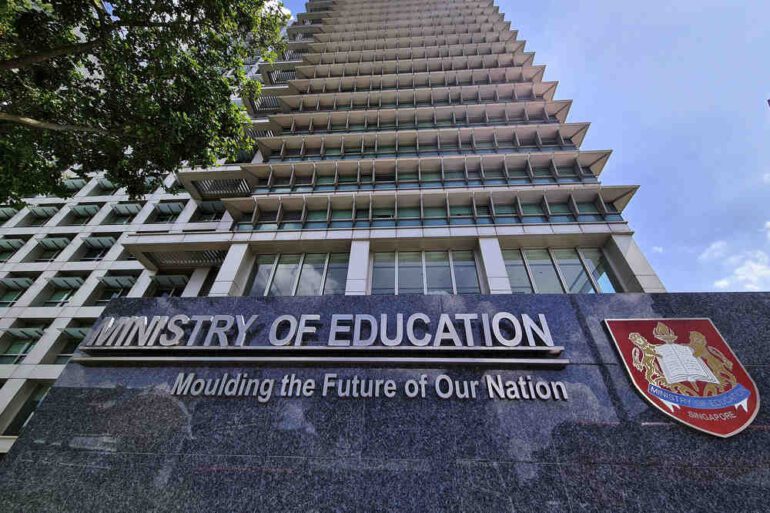TL;DR:
- Singapore’s Ministry of Education (MOE) is expanding the use of AI in schools following the success of AI tools like the Adaptive Learning System in mathematics.
- AI in Rosyth School helps identify students needing assistance in math, saving time and providing valuable insights.
- Education Minister Chan Chun Sing announces the EdTech Masterplan 2030, focusing on technology’s transformative potential in education.
- The AI-enabled Adaptive Learning System customizes learning recommendations based on student responses and is integrated with the national online learning platform.
- AI serves as a pre-learning tool, allowing students to explore topics before classroom instruction and aiding teachers in tailoring lessons.
- AI literacy programs prepare students for a technology-driven world and are developed in collaboration with AI Singapore.
- AI simplifies some educational aspects, allowing teachers to focus on complex challenges and responsive teaching.
- Singapore is committed to holistic and ethical AI integration, ensuring students are prepared for AI’s societal impact.
Main AI News:
In a groundbreaking move that promises to redefine the landscape of education, the Ministry of Education (MOE) in Singapore is poised to expand the integration of artificial intelligence (AI) into its schools. This strategic shift comes on the heels of the successful implementation of AI tools, particularly the Adaptive Learning System for mathematics, which has garnered widespread acclaim in Primary 5 classrooms across the nation.
At Rosyth School, an institution at the forefront of this educational transformation, AI has emerged as a key ally in the quest for enhanced learning outcomes. Teachers, supported by AI technology, now possess the means to swiftly identify students in need of additional assistance in specific mathematical areas. According to Senior Teacher Edmond Lee, this innovation has not only streamlined the assessment process but also unearthed critical insights into students’ comprehension gaps, enabling educators to tailor their approach effectively.
Gone are the days of laborious manual score tabulation. The AI-driven system seamlessly compiles data, providing teachers with precious time to focus on pedagogical excellence. Mr. Lee emphasized, “Instead of the traditional way of tabulating one by one, the system helps us so that it… saves us some time in gathering feedback (manually).”
The success story at Rosyth School is just the beginning. In June, the MOE launched the Adaptive Learning System for mathematics in collaboration with 33 pilot schools. Now, Education Minister Chan Chun Sing has announced the forthcoming expansion of AI tools under the EdTech Masterplan 2030. This visionary initiative seeks to harness the transformative power of technology in the realm of teaching and learning.
The core of this technological revolution is the AI-enabled Adaptive Learning System, leveraging machine learning to offer personalized learning recommendations based on each student’s interactions with questions and activities. This system is seamlessly integrated with the Singapore Student Learning Space, the national online learning platform, fostering a holistic educational environment.
AI serves as a pre-learning tool, enabling students to explore upcoming topics before classroom instruction. Teachers then utilize AI-generated feedback and data to identify and address areas where students may struggle, tailoring their lessons for maximum effectiveness.
Principal Finella Goh of Lakeside Primary School noted that AI empowers students to learn at their own pace, echoing a sentiment shared by Mr. Lee. Teachers can now “meet students where they are” and adapt their teaching methods accordingly.
This evolution goes hand in hand with Singapore’s National AI Strategy, as highlighted by Education Minister Chan at the Schools Work Plan Seminar 2023. Moreover, AI literacy is becoming a cornerstone of the educational process, with schools like Anderson Serangoon Junior College implementing AI literacy programs in collaboration with AI Singapore.
These programs introduce students to fundamental AI concepts, theories, and potential applications, preparing them for a technology-driven future. Schools are partnering with official AI bodies to ensure students are exposed to safe and age-appropriate AI tools.
As AI permeates the classroom, teachers can better monitor students’ progress and tailor their teaching methods to individual needs. The AI-enabled Adaptive Learning System not only serves as a pre-learning tool but also reinforces concepts and provides additional practice in areas yet to be covered in class.
In the words of Mrs. Goh, AI allows for “responsive teaching and learning.” It empowers educators to focus on student well-being, engagement, and the nuanced aspects of education, while AI handles certain foundational concepts.
While AI can simplify certain aspects of education, teachers remain irreplaceable when it comes to guiding students through complex challenges. As Mr. Lee emphasized, “When it comes to the difficult (problems), we really need to be in class and guide people through.”
Singapore’s commitment to integrating AI holistically and ethically into education is evident. Schools like Rosyth School are adopting comprehensive media literacy frameworks to ensure students are prepared for AI’s impact on society. These efforts encompass ethical considerations and foster values that align with technological advancements.
Conclusion:
Singapore’s strategic embrace of AI in education signals a transformative shift towards personalized learning, data-driven insights, and dynamic pedagogy. This forward-thinking approach positions Singapore as a leader in preparing students for the technology-driven future, with the potential to drive innovation in the global education technology market.

